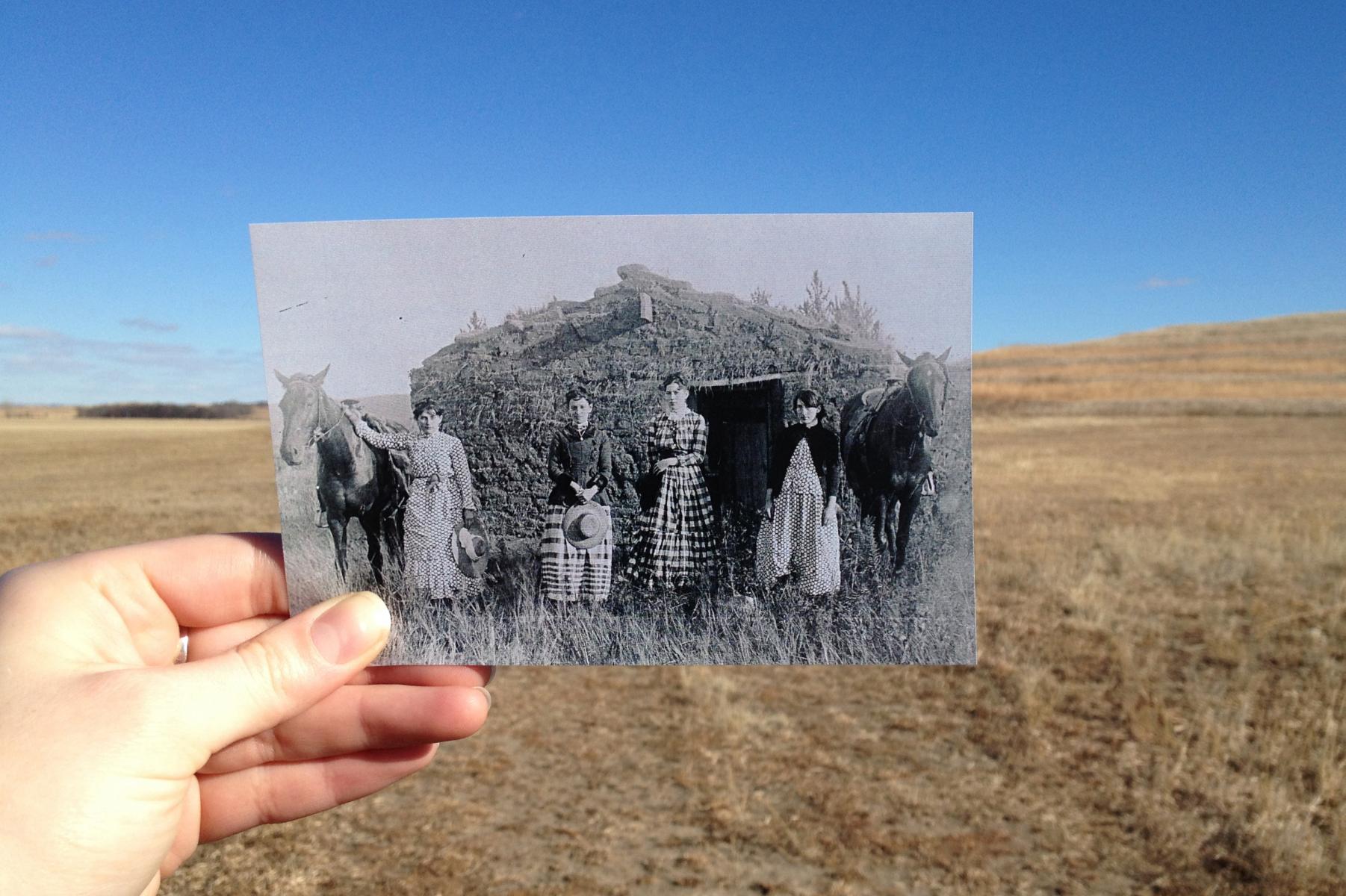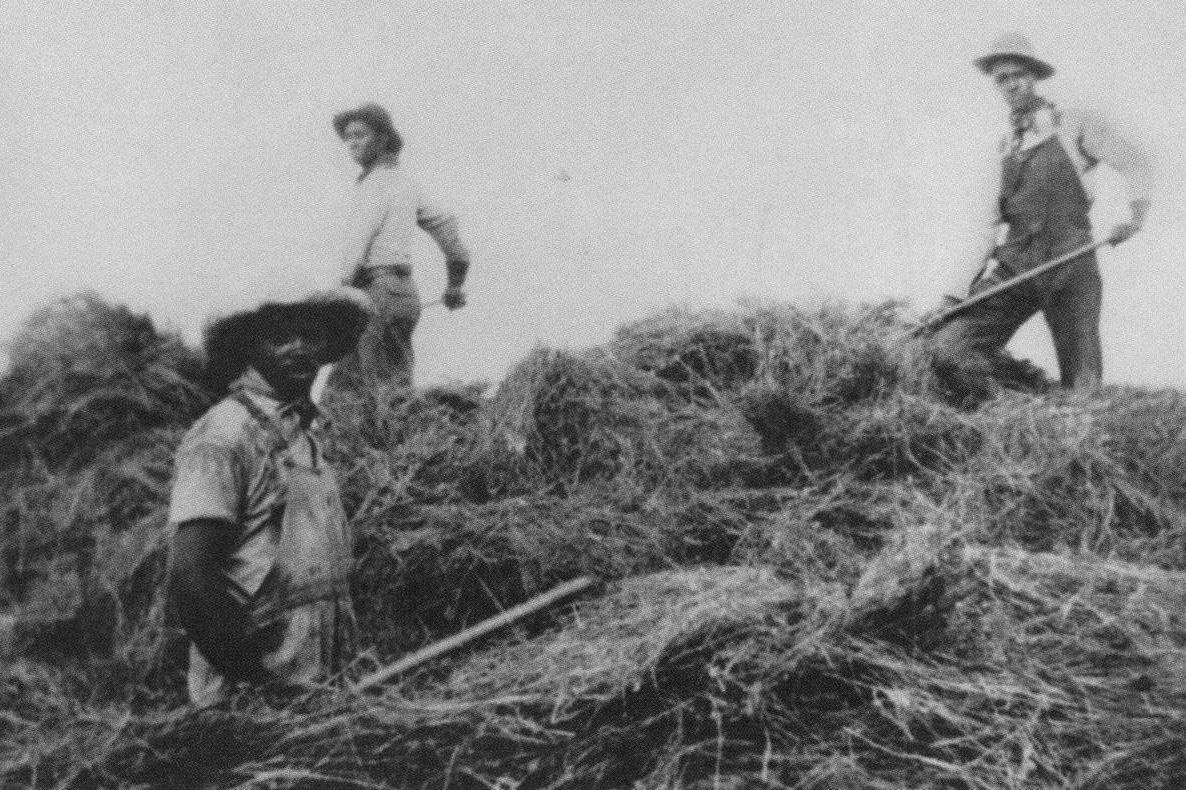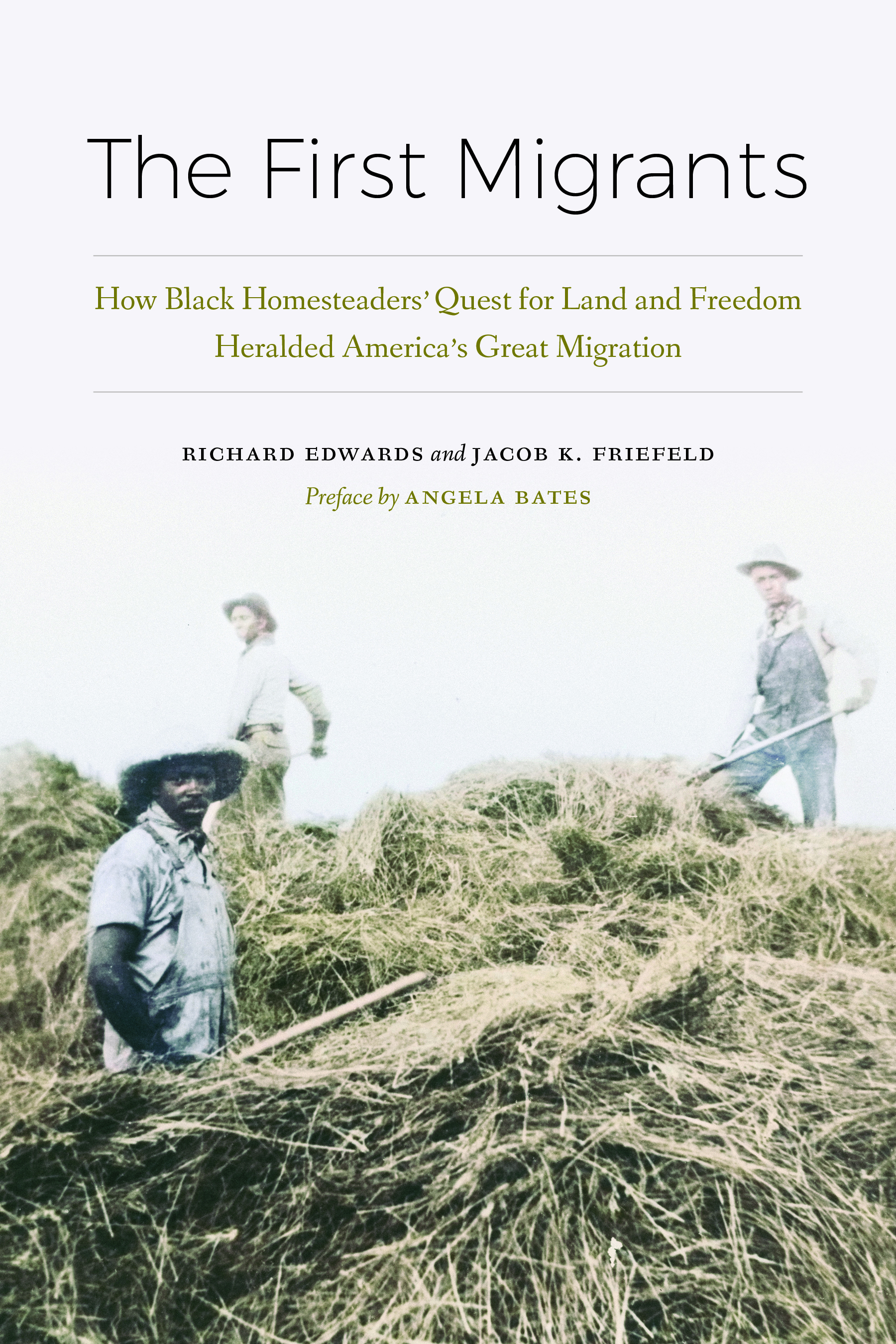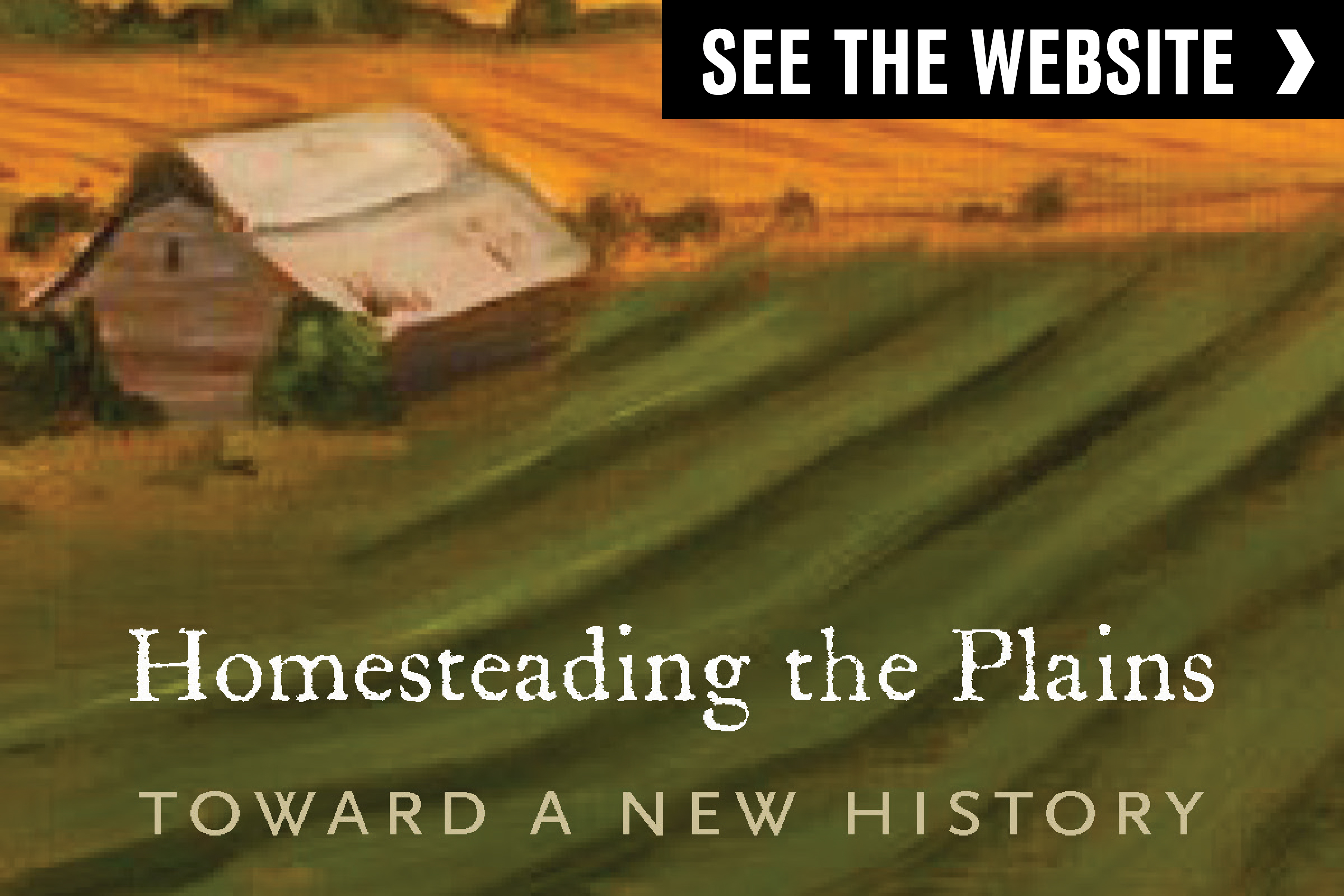
Homesteading was a central feature of the Euro American, African American, and immigrant settlement of the Great Plains. On May 20, 1862, President Abraham Lincoln signed the Homestead Act, formally “an Act to secure Homesteads to actual Settlers on the Public Domain.” Under it, the federal government offered settlers 160 acres of free public land. You had to pay a small processing fee, you had to live on your claim for five years and fulfill some other requirements, and then you “proved up” your claim to obtain your patent (title). Homesteading was open to male citizens over 21, war veterans of any age, widows and single women, married women who were heads of households, and new immigrants if they simply affirmed their intention to become citizens. When an 1866 civil rights act clarified that blacks were citizens, African Americans could and did homestead, too, as could citizens of Asian descent after an 1898 Supreme Court decision. The Act opened lands in 30 states, though principally homesteading occurred in the states north of Texas and west of the Missouri River. Between 1863 and 1961, approximately 1.6 million homesteaders successfully staked their claims and obtained title to their land. It has been called the federal government's biggest wealth-redistribution program ever.
The goal of the Center's project is to make available data and other resources on homesteading to scholars and to provide an accurate and authentic narrative of the homesteading experience.
Black Homesteaders
This project seeks to learn, preserve, and disseminate the story of African Americans who homesteaded in the Great Plains. The project is a collaborative effort with Nicodemus National Historic Site and the Homestead National Historical Park and is partially funded by the National Park Service.
The project is producing a general survey of Black homesteaders in eight states: Montana, New Mexico, North Dakota, South Dakota, Wyoming, Nebraska, Kansas, and Colorado. The research will create the first extensive database of black homesteaders in these states.
The project also focuses on six important Black homesteading communities or ‘colonies’: Blackdom, NM; Nicodemus, KS; DeWitty, NE; Empire, WY; Dearfield, CO; and Sully County, SD. They are the largest and longest-lived communities in each state.

Records Collection
Homestead National Monument of America, in partnership with the Center, the University of Nebraska, The National Archives and Records Administration, Ancestry.com, Family Search, and Fold3, is in the process of digitizing and making accessible the Homestead Case Files.
These records are extraordinarily informative, but for years have been under-used by scholars and family historians alike because of access has been difficult. Now files are being digitized and made available, and several states are already complete including Nebraska, Arizona, Illinois, Indiana, Nevada, and Ohio. For access information, visit HNMA's website.
The First Migrants: How Black Homesteaders’ Quest for Land and Freedom Heralded America’s Great Migration
The First Migrants recounts the largely unknown story of Black people who migrated from the South to the Great Plains between 1877 and 1920 in search of land and freedom. They exercised their rights under the Homestead Act to gain title to 650,000 acres, settling in all of the Great Plains states. Some created Black homesteader communities such as Nicodemus, Kansas, and DeWitty, Nebraska, while others, including George Washington Carver and Oscar Micheaux, homesteaded alone. All sought a place where they could rise by their own talents and toil, unencumbered by Black codes, repression, and violence. In the words of one Nicodemus descendant, they found “a place they could experience real freedom,” though in a racist society that freedom could never be complete. Their quest foreshadowed the epic movement of Black people out of the South known as the Great Migration.
Richard Edwards is the Center's former Director and Jacob K. Friefeld is a former Great Plains Graduate Fellow.
'Homesteading the Plains'
The Center for Great Plains Studies and the University of Nebraska Press released Homesteading the Plains: Toward a New History in September 2017. The book, by Richard Edwards, Jacob K. Friefeld, and Rebecca S. Wingo, reexamines the current consensus interpretation by historians of homesteading’s role in the settling of the American West.
"[Homesteading the Plains] represents the first fruits of a massive digitization project. Two million individual land claims filed between 1862 and 1985 produced some 30 million pieces of paper. Nebraska claims are the first to be completely digitized. Stay tuned—there is much more to come."
-- Choice Reviews
Professor Richard White of Stanford noted that “Homesteading the Plains, the first major scholarly study [of homesteading] in a generation, uses new data sources and new digital techniques to present a nuanced account of an important government program that scholars will need to reevaluate.”
"Homesteading the Plains unsettles longstanding homesteading myth and history alike. Provocative and illuminating, it offers new data, technologies, and questions to open new historical terrain."
—Elizabeth Jameson, University of Calgary

Homesteading Research
This work seeks to explore and explain homesteading in the Great Plains.
Published:
- “To Commute or Not Commute: The Homesteaders’s Dilemma” Great Plains Quarterly 38.2 (Spring, 2018), Richard Edwards.
- “The New Learning about Homesteading” Great Plains Quarterly 38:1 (Winter, 2018), Richard Edwards.
- Changing Perceptions of Homesteading as a Policy for Public Domain Dispersal, Great Plains Quarterly
- Why Homesteading Data Are So Bad (and What to do About it), Great Plains Quarterly
- Essay for Obama inauguration, Jan. 21, 2013
Forthcoming:
Great Plains Homesteaders by Richard Edwards, a new entry in 2024 for the Discover the Great Plains series. Great Plains Homesteaders tells the story of homesteading through the individual stories of homesteaders using their own experiences and words.
Dr. Mikal Eckstrom talks about his newest article in "Great Plains Quarterly" on the homesteader site of DeWitty, Neb., titled "Staking Their Claim: DeWitty and Black Homesteaders in Nebraska."
Read the article on Project Muse
Discover the hardships and successes of six Black homesteader colonies in the Great Plains in the latest article from the Homesteading Project from Jacob Friefeld, Mikal Eckstrom, and Rick Edwards.
Read the article on Project Muse
Recently freed slaves had the opportunity to homestead on land in five Southern states thanks to the 1866 Southern Homestead Act, but in this video, Rick Edwards talks about how extreme poverty, violence, and unsuitable land made it nearly impossible for many to take advantage of it, leading them to homestead in the Great Plains instead.
Read the article on Project Muse
Content.
Praise for Homesteading the Plains: Toward a New History
"Homesteading the Plains fundamentally alters the dominant frame for understanding the costs and consequences of settling the Great Plains. Not only have Edwards, Friefeld and Wingo amassed an astonishing amount of big data about homesteading—characteristics of land takers, who succeeded, who failed, and why—but they broaden our analytic perspective to include what the consequences of legislation and peopling meant for Native Americans whose land—through conquest and treaty—became public domain. Engagingly written, full of lively people’s stories, this book upends many tired and baseless myths about the settlement of the continent. The authors tell a nuanced, fascinating national story that is regionally rooted and beautifully illustrated with tables, charts and maps."
—Karen V. Hansen, Brandeis University
"Homesteading the Plains is a provocative plea for a new history of the Homestead laws. The authors argue that a yawning gap exists between public perceptions of the free land granting policies as great successes and negative scholarly assessments of those same laws as ineffective and even harmful failures tainted by fraud and corruption. The gap can and should be closed, they tell us in a compelling brief for historical revisionism, by critiquing dominant evaluations of the homestead laws and reexamining them with the kinds of questions, methods, and evidence that fill the pages of their book. Anyone interested in understanding the place of these almost mythic laws in the American past must read Homesteading the Plains."
—Michael Grossberg, Indiana University
"Homesteading the Plains unsettles longstanding homesteading myths and histories alike. Provocative and illuminating, it brings new data, technologies, and questions to open new historical terrain."
—Elizabeth Jameson, University of Calgary
"This careful empirical analysis provides a long overdue corrective to frequently cited but flawed “facts” about homesteading in the nineteenth-century West. The authors persuasively demonstrate the impressive achievements of the Homestead Act and incisively evaluate the degree of fraud and Indian land dispossession on the homesteading frontier."
—Brian Cannon, Brigham Young University
“A welcome contribution to the understanding of our region.”
—Omaha World-Herald
"Attractively and accurately written, this book demolishes much conventional wisdom about homesteading — that it was a minor factor in settlement, that most claims never proved up, that fraud was "rife." The book also seriously revises the idea that homesteading dispossessed Indians, expands our understanding of women homesteaders, and explains how homesteading helped build communities. This is the most thoughtful analysis of homesteading to appear in many years."
—Walter Nugent, University of Notre Dame (emeritus)
"Solidly researched, clearly written, logically organized, and cogently argued. The publication of Homesteading the Plains will not only be a contribution to knowledge but also field-altering in terms of the way scholars must hereafter write and teach about the Homestead Act."
—R. Douglas Hurt, Purdue University
"The authors make a strong case for the need to revisit the history of homesteading, offering a comprehensive account of the historiography of the last five decades alongside their own interventions into the literature. Homesteading the Plains also integrates an important spatial dimension into our understanding of the relationship between homesteading and Native American dispossession, which has great potential for reshaping the history of land policy in the Americas."
—Sara Gregg, University of Kansas
“Homesteading the Plains does an excellent job of providing reasons to be excited for the future of homesteading research while celebrating the past success of the Homestead Act, its principal role in the history of both the Great Plains and the entire country, and its enduring legacy on the land and the people who call it home.”
—Andrew Husa, Great Plains Quarterly
“The authors make a strong case for the need to revisit the history of homesteading, offering a comprehensive account of the historiography of the last five decades alongside their own interventions into the literature. Homesteading the Plains also integrates an important spatial dimension into our understanding of the relationship between homesteading and Native American dispossession that has great potential for reshaping the history of land policy in the Americas.”
—Sara Gregg, associate professor of history and environmental studies at the University of Kansas
“Homesteading the Plains is an important revisionist work—a must-read for those interested in the revitalization of historical interest in homesteading and the settlement of the Far West.”
—Mark M. Carroll, Western Historical Quarterly
“Homesteading the Plains is a provocative, well-informed, and strongly argued analysis of the role of homesteading in settling the Great Plains from 1863 to 1900. . . . Throughout the book the factual evidence is enriched by the stories of individual lives which are also embedded in the records. The result is a definitive analysis which is also a pleasure to read. It will serve as a model for future historians who want to circumvent the myths and find the facts about homesteading and its role in the development of the nation.”
—David J. Wishart, Nebraska History
“Every library with any interest in frontier, western, and Great Plains history should have a copy of this book.”
—S. D. Reschly, CHOICE
“A must-read for Great Plains scholars, as well as for those interested in the American West and in GIS applications. It is a much-needed call for a revitalization of homesteading scholarship, and an example of how dramatically technology and historians’ increased access to data can shift the historiography. The authors should be congratulated on their contribution to future Great Plains studies, as their book will doubtless serve as a fine kick-start to a new renaissance in homesteading research.”
—Julie Courtwright, Missouri Historical Review
“Homesteading the Plains . . . opens up new—and long overdue—insightful and analytical possibilities through the authors’ use of recently digitized homestead records that, paired with county land records, military and census records, and survey maps, should reverse the often baffling degree of scholarly disparagement of the subject. . . . [It] represents an exciting new starting point for studying the Homestead Act’s impact on agricultural expansion.”
—Ginette Aley, Kansas History
“Recommended for all plains folk who like to brandish their homestead certificates, or who just share a tie to the land.”
—Prairie Public News


